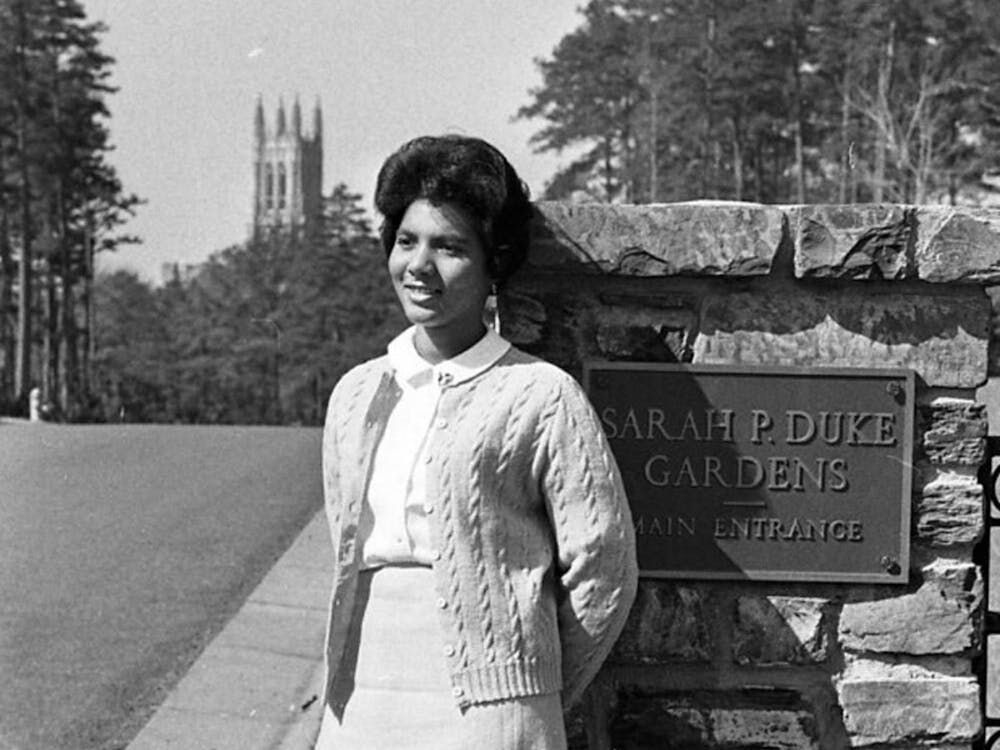One day, Wilhelmina Reuben and Gene Kendall left East Campus to see the new James Bond flick at a local theater. The two grabbed a hamburger after the movie. Suddenly, Reuben realized that she needed to rush back to East. Taking off her shoes, she and Kendall sprinted back to campus. He may have been on the track team, but she still beat him back to campus—in the nick of time.
That scene could easily have been taken place at Duke today with any two students. But Reuben and Kendall’s day took place in the 1960s, when East Campus, the home of the Woman’s College, had a curfew. And Reuben and Kendall weren’t just any two students—they were two of the first five black students at Duke.
Kendall recalled the story at a December memorial service for Wilhelmina Reuben-Cooke, who died Oct. 22.
Reuben-Cooke, Woman’s College ‘67, had a decorated career, both at Duke and beyond. The Georgetown, S.C., native arrived in Durham in 1963 as part of an effort to desegregate a previously all-white university.
She excelled at Duke, getting elected to Phi Beta Kappa and chair of the Freshman Advisory Council, which “literally shaped new students’ perceptions and commitment to Duke,” said Dennis Campbell, Trinity ‘67, Ph.D. ‘73 and vice chair of the Duke Endowment, at the memorial. Reuben-Cooke was also tapped by the White Duchy society and was selected by her peers in the Woman’s College as the 1967 May Queen, a decision that made it into The New York Times.
After graduation, she enjoyed a stellar career as an attorney, as well as a law professor at Syracuse University and the University of the District of Columbia, where she worked as UDC’s provost. Reuben-Cooke never let go of her Duke ties, however. She served two terms on the Board of Trustees, and in 2011 the Alumni Association awarded her the Duke University Distinguished Alumni Award. A $1 million scholarship fund was announced in 2013 to honor her and the other four first black undergraduates.
‘Go out and live that life’
A wide range of speakers sang Reuben-Cooke’s praises at her memorial service in the Chapel, including her professional colleagues, Duke classmates and family. They shared a mix of fond memories and reflections on her legacy.
Nancy Benner, Woman’s College ‘67, roomed with Reuben-Cooke for three years. She recounted how she and “Mimi”—Reuben-Cooke’s nickname—became addicted to Zero candy bars because the two would get hungry studying late at night, and they could get the bars in the vending machine. In fact, they saved so many wrappers that they earned a free Zero bar T-shirt.
Benner touched on Reuben-Cooke’s civil rights record as a student, as Reuben-Cooke became an active member of civil rights protests in Durham and Chapel Hill.
“There were civil rights protests taking place all over the country, and Mimi completely became a part of them,” she said. “I remember once going to her room freshman year telling her that I was afraid for her safety—I was worried she was going to get arrested. She did not seem very concerned.”
Kendall, after telling the James Bond story, summed up Reuben-Cooke’s virtues with a story about a young girl at a relative’s funeral who was impressed with the kind words said about her relative.
"She said, 'Grandpa, how can I get someone to say nice things about me?' He said to her, ‘Write down all of the things that you would like to have said about you… and go out and live that life.’ Wilhelmina Matilda Reuben-Cooke—'Mimi'—obviously wrote down those things," he said.
Continuing her legacy
In 2013, Duke celebrated the 50th anniversary of Reuben-Cooke and her classmates arriving at the University. There were events in major cities across the country, culminating in an artistic program in Page Auditorium. Keith Daniel, Trinity ‘90, M. Div. ‘05 and D. Min. ‘16, was chosen to be the project manager for the commemoration. Despite briefly working with her, he got to know Reuben-Cooke enough to be moved by her grace and vitality.
“She just always had such a presence around her that clearly inspired me as someone who's now approaching my 30th class reunion this spring from Duke,” he said.
Chandra Guinn, director of the Mary Lou Williams Center for Black Culture, holds up Reuben-Cooke as “the standard-bearer and a model” for students who feel challenged at Duke, due to her desegregating the University and finding ways to contribute in different fields throughout her life.
When asked what students can learn from Reuben-Cooke today, Guinn replied in an email, “never give up.”
“Be ever mindful and intentional in your efforts to cultivate individuals to follow in your footsteps even as you are unsure of where the path will lead you,” she added. “Walk with your head held high, demonstrate dignity in your doing and dealings and be sure to secure the crown.”
Marcus Benning, Trinity ‘14 and Law School ‘17, had the chance to meet Reuben-Cooke during the commemoration as president of the Black Students Association. He explained that her legacy is most visible in the organizations created after her graduation, such as the Afro-African Society—the precursor to the Black Students Alliance, the Presidential Council on Black Affairs, Black Students Association Invitational and all of the black student groups that exist today.
"When you think about the fact that BSA came the year that she graduated, and there were only five students in the first class, you could see that her community of students were really focused on institution building,” he added.
Benning said that Reuben-Cooke’s death exemplifies that in the midst of losing many post-civil rights era leaders and trailblazers, there is still plenty of work that needs to be done beyond commemorating their legacy. He referenced the noose found hanging in the Bryan Center Plaza in 2016, just three years after the 50th anniversary commemoration, as an example of why students today need to continue the work of people like Reuben-Cooke.
“Based on the work that her family has done, which has always been forward-looking to increase access to the University, I think it's really incumbent upon us to view her work as incomplete and ongoing, and now that we no longer have her to contribute, that we pick the baton up and move the mantle forward,” he said.
Get The Chronicle straight to your inbox
Signup for our weekly newsletter. Cancel at any time.

Jake Satisky is a Trinity senior and the digital strategy director for Volume 116. He was the Editor-in-Chief for Volume 115 of The Chronicle.

